WELLBEING | Using Gratitude, Mindfulness & Nature To Deal With Mental Health Issues & Peri-Menopause
Knowing that you aren’t alone can be enough to provide comfort sometimes, so this is one of my rare personal posts where I share and muse on my own struggles with chronic pain, anxiety and depression.
Just to be crystal clear, I am not self-diagnosed. I have in the past been medically diagnosed and treated for Depression, Generalised Anxiety Disorder, Panic Attacks, Insomnia, Fibromyalgia, Palindromic Rheumatism and a couple of years ago, I began perimenopause.
In this article I talk about some of the things that have helped me, including ecotherapy (in particular spending more time being active outdoors), mindfulness and gratitude, approaches that have helped me greatly and you never know, they might just help you too…
 I wrote this on the beach in Cornwall in early 2018, I sat on the rocks until I was wet through and shivering – I really wasn’t OK.
I wrote this on the beach in Cornwall in early 2018, I sat on the rocks until I was wet through and shivering – I really wasn’t OK.
Living with depression and chronic pain can bring with it a number of challenges. From personal experience, following my snowboarding accident (more about that later), the frustration of often being unable to do what I wanted badly affected my mental health, causing the depression I had first experienced as a new mum, to resurface.
During my protracted recovery which was delayed as a result of the NHS failing to diagnose my broken back until several months later, maintaining a healthy weight became much more challenging, and trying to stay active when my body was unable to cooperate was maddening, all of which contributed to a very dark state of mind.
A bit about my accident
I’d always been relatively active and was fairly fit. I loved the gym and much preferred being up and outdoors to sitting around. Then, back in 2014 I had a snowboarding accident and I broke my back, a compression fracture of my T10 to be exact.
 Snowboarding in Whistler before the accident that proved to be a turning point in my life.
Snowboarding in Whistler before the accident that proved to be a turning point in my life.
My immune system kicked in, but sadly stayed switched on, even after my back had improved (though it will never fully heal now). My own immune system started to attack my healthy joints, leading to systemic inflammation and a triple diagnosis’ of Sero-Negative Palindromic Rheumatism, Chornic Pain and Fibromyalgia. Whilst I’ve never agreed with or accepted the latter diagnosis, to make things more difficult, different experts don’t agree on my autoimmune condition. My current specialist believes I have pre-radiographic Ankylosing Spondylitis. I also have disc lesions throughout my lumbar spine, and my T10 has a permanent bulge.
I’ve grown accustomed to living with constant unrelenting pain; something anyone with chronic pain will identify with.
4 years on, I still have days where rolling over in bed, bending, getting in or out of the car or getting dressed on my own is difficult, but I’ve grown accustomed to living with constant unrelenting pain; something anyone with chronic pain will identify with, and it’s not nice, but you establish a new ‘normal’ and a new ‘OK’ and go from there.
I was literally mourning the loss of my old life.
In the early days following my injury when pretty much all I could do was lie in bed, I felt a great deal of sorrow, and not knowing whether I’d be wheelchair bound or not, caused me to become withdrawn and depressed; I was literally mourning the loss of my old life. My future felt bleak and for a short time, I was of a mindset that if I couldn’t enjoy the outdoors and feel the buzz of adrenaline that things like snowboarding gave me, then my life was pretty much pointless.
 Back on the water, kayaking after a 2 year break. Kayaking always centres me and makes me feel calm.
Back on the water, kayaking after a 2 year break. Kayaking always centres me and makes me feel calm.
Why I refused to go back onto antidepressants
Under several different specialists by this point, they wasted no time in telling me I was depressed. Interestingly, they rushed to medicate with antidepressants and exceptionally strong and addictive painkillers, but never once offered any advice on how to help myself feel better mentally or on physical rehabilitation. In fact it was several more months before I got to see a physiotherapist for the hydrotherapy that common sense told me I needed and had been giving myself in the pool at my gym for months.
I refused antidepressants reasoning I wanted to focus on the cause of why I felt so low, which of course boiled down to being in constant pain and being physically unable to move enough to make myself feel better. Taking pills in order to function without addressing the root cause, is why, in my opinion, so many people in the UK are now living with long term health conditions, particularly things like depression and chronic pain. I strongly believe in cases like this that pills aren’t helpful long-term and certainly don’t offer a healthy ‘solution’ because treatment with pills does nothing to address the underlying cause(s).
Having taken antidepressants over 20 years ago, I know they can be helpful in a crisis, I’m in no way knocking them, but having been down that road before It’s not an experience I wanted to repeat.
After being diagnosed with postnatal depression and put on Prozac, it took me many years to come off it, resulting in horrendous withdrawal effects (severe insomnia, extreme dizziness and ‘head shocks’) and at that time nothing was documented about withdrawal as the drug was still relatively new. There was no helpful tapering off plan, in fact my GP told me I was making the withdrawal effects up. Yeah, thanks for the help.
 I’m largely well now, but I still have bad days – when I lose my way it doesn’t take me long to find and get back on the right path
I’m largely well now, but I still have bad days – when I lose my way it doesn’t take me long to find and get back on the right path
It’s probably not surprising that I did not want to go down that route again and was determined to find an alternative way to deal with my depression which, this time felt easier to understand as there was a clear cause (pain and lack of mobility) and effect (persistent low mood).
I couldn’t do much activity wise, so I had a lot of time to think, and I felt instinctively that spending more time immersed in nature was what I needed to kickstart my emotional healing process, and that hunch turned out to be right.
The medical profession wasted no time in essentially writing me off, and I was simply advised to work fewer days and to lower my expectations of what I could do.
At that time however, walking for any distance was still very painful which made spending any meaningful time outdoors difficult and I still couldn’t drive too far.
As someone used to adrenaline sports and high impact gym classes, a gentle stroll down the road made me feel thoroughly terrible and did nothing to help my mental state. At this stage I still couldn’t even manage gentle Yoga or Pilates and I felt trapped and hopeless; utterly defeated by the unrelenting pain.
Ignoring poor medical advice and remaining stubborn as hell
Very early on, the medical profession wasted no time in essentially writing me off, and I was simply told with a dismissive shrug to “give up work or just work fewer days” and to lower my expectations of what I was physically capable of doing.
Shocked by the attitude of the experts that were meant to be helping me get better, I realised they actually either didn’t care or had no clue how to help me.
I was determined to do something, and stubborn as ever, I chose to ignore their bleak prognosis and summoned all of my courage and went back to the gym after 8 weeks away.
I went swimming, and whilst it certainly wasn’t pain free, I managed a short swim. Instead of feeling happy I’d found something physical I could do, I was in turmoil. A 20 minute swim was a huge breakthrough, but it seemed pathetic compared to what I used to do, and the hopeless feeling triggered self loathing which all contributed to worsening the depression I was in. I became even more withdrawn and It was at that low point, that I realised I had a choice.
I could either admit defeat and let the pain and disability limit my life, or I could do everything possible to manage and live with it.
 Camping allows me to spend extended periods of time outdoors, which centres me and staves off depression.
Camping allows me to spend extended periods of time outdoors, which centres me and staves off depression.
My personal turning point
Gradually I moved from feeling like my life was over, to recognising how lucky I was. As the months went by, I realised I should be grateful that I wasn’t paralysed, and so I started using the mantra “it could have been so much worse”. It was around this time too that the #ThisGirlCan advertising campaign was launched and the mindfulness movement too was gaining a voice, and both of those things really resonated with me.
The change in mindset galvanised me into action, as well as starting this blog, I did more of the only thing I could do at that time, which was swimming. I started getting up at 6am and going every morning before work. After a couple of months, the physical activity had banished much of my depression, and I was able to begin accepting and shaping the ‘new’ me.
I was doing things that some of my able-bodied friends couldn’t do, and that realisation spurred me on.
Instead of focusing on the things I couldn’t do, I focused on the positives. I thought about how determined I must be for sticking to my morning swimming routine, how tough I was because I wasn’t choosing the easy option, how grateful I was that I still had the use of my legs and could swim at all, and I looked better and felt fitter too….and I was doing it all despite being in so much pain that I’d often be crying into the pool as I swam.
Gradually I stopped feeling like a victim and I felt like a warrior. The more I swam the stronger I got and the more endorphins my brain created.
I realised that I was doing things that some of my depression-free, able-bodied friends couldn’t do! That realisation was epic and really helped to spur me on.
 Walking at The Roaches, Peak District. Hill walking is always a great way to improve my mental state.
Walking at The Roaches, Peak District. Hill walking is always a great way to improve my mental state.
Learning the art of positive self-talk and nature focused mindfulness
Instead of constantly berating myself for the things I couldn’t do, I started instead to congratulate and be kinder to myself, which helped lift my self esteem.
After a couple of months of swimming 5 days I week, I started doing gentle Yoga at home in the evening too. Then I started going out for little walks at lunch time at work and gradually my fitness started to increase again and It took time, but I lost almost 3 stone and amazingly, I now felt like I was managing my pain and not the other way around.
I read a lot about mindfulness at the same time, and started to become more aware of my natural surroundings. I started looking at plants and trees and really seeing them, I started to learn to identify birds, wild plants and spent time in the woods beside my house immersing myself in the natural world. It’s then that true happiness slowly crept back upon me.
Left unchecked, that can quickly become the norm, impacting your beliefs and expectations of yourself – ultimately making your world much smaller.
With any kind of chronic pain and debilitating condition, it is so easy to let it win, especially when you’re not in a positive state of mind. From the many forums I’d participated in, it felt like some people with a similar diagnosis to me used it as an excuse to not even bother trying; validating their decision to sit on the sofa and watch TV all day.
Admitting defeat occasionally is necessary I’ve learned, but left unchecked, that can quickly become the norm, impacting your beliefs and expectations of yourself – ultimately making your world much smaller.
Of course I’m aware that all chronic pain is not the same, and disability is subjective and varies greatly in how badly it impacts peoples lives. It’s not always a simple case of mind over matter, and I’m in no way saying it’s easy or something anyone can just ‘do’, but in my experience, expressing gratitude and adopting a more mindful and nature-aware mindset had a huge impact, both mentally and physically.
 Near the summit of Snowdon, something at one point I never thought I’d be able to do.
Near the summit of Snowdon, something at one point I never thought I’d be able to do.
What have I learned in the past few years?
1. Being active and spending time outdoors isn’t optional
I’ve learned that the stress relieving effects of both physical activity and spending time outdoors connected to nature is critical to my mental wellbeing, even more so than for my physical wellbeing. Suse wrote a wonderful article on mindfulness here Stop, stop and listen for the bough top is whistling.
2. Stopping negative self-talk is important
I learned not to blame myself or beat myself up, though this was hard. After the accident I could barely move, and I put on weight and it caused self loathing that fueled my depression.
Building up my activity levels again gave me a different perspective on myself, doing something was better than nothing, however futile it felt at the time.
We all know that being nice to other people is important (in fact ‘don’t be a dick’ is something I live by), but how often do we really apply that kindness to ourselves?
3. Accepting limitations and celebrating achievements
Acceptance of my limitations was something that I battled against for a long time. I was strong and capable and could do anything I felt like doing prior to the accident, and I didn’t need anyone’s help.
Coming to terms with the fact that this was no longer the case, was probably the most difficult thing for me, but that doesn’t mean I accepted what I’d been told.
I instinctively fought against my prognosis and have achieved things mentally and physically at one point I’d have never have thought were possible.
4. It’s OK to admit defeat occasionally, but it can’t become your norm
Learning to listen to my body and rest when necessary, and even having to cancel plans, is something I do still battle with. I’m rubbish at resting, and as a result end up operating at full capacity for months on end, then I tend to burn out and crash.
This is something I’m still trying to improve on…but when I do get a truly bad day, I no longer beat myself up about it or feel guilty. I simply accept that right now a ‘wasted’ rest day is what I need and that the mountain of stuff I won’t get done will just have to wait.
5. Menopause can play havoc with mental health
In February 2018 year I had a very unexpected and intense mental health episode. I was on my own down in Cornwall on a press trip. I had been looking forward to it greatly but something happened in my head that didn’t respond to deep breathing, meditation or rationalisation.
The best way to describe it was like being in the grip of an intense panic attack, only one that lasted for days, with no let up. It destroyed my ability to sleep, eat and think straight. I was shaking, felt like I couldn’t breathe and genuinely felt like I was losing my mind.
It came out of nowhere with such force that it totally floored me. None of my usual techniques helped. I actually ended up in A&E and was given some emergency medication to calm me down and help me sleep.
After some further investigation It looked like the episode was down to a big drop in Estrogen and I was told tests showed I had started the menopause process early (some 10 years earlier than my mum, who sailed through it and didn’t even notice!).
The fluctuations in hormone levels I’m still experiencing some 2 years after first writing this, are still extremely difficult to cope with and play havoc with my wellbeing, causing anxiety to spiral out of control and I’m trying hard to find ways to cope with it, but at times, when all self-help fails and I have no choice but to reach for the Diazepam, it can feel pretty scary and lonely.
Very few medical resources about menopause touch on the subject of the intense mood swings, anger and anxiety the a drop in Estrogen and other fluctuating hormones can cause and those that do, downplay it.
Of course everyone’s experience of menopause is different, but the intense and often debilitating anxiety and PMS style symptoms that my fluctuating hormones have caused, have perhaps been the most challenging mental health issues I’ve had to deal with in my lifetime.

I’ve learned that it’s Important to listen to my body and rest when necessary
6. It’s never too late to change your mindset and surprise yourself
With the right mindset I have learned that some of my anxiety and much of my chronic pain can be managed. I moved from a negative, frustrated tone of self-talk, to forcing myself to think more positively, remembering my mantra “it could have been so much worse” all the time.
I have the odd day, when I don’t win; when the pain is unrelenting and I’m so exhausted from constantly fighting it, that my body just gives in and forces me to take a rest day, and that’s OK.
Taking each day as it comes, no longer being scared to make plans or push myself, is the mindset that has turned me into a warrior; a person I can be proud of being, and that’s played a big part in managing my depression and spurring me on to do things I’d never thought I’d be able to do, even before the accident!
7. Setting small achievable goals
My GP and specialist told me that I needed to do less and accept my limitations, essentially, stop fighting. To that I say bollocks.
But even so, If you’d have told me 4 years ago that by 2018 I would be doing solo walks up mountains, regularly swimming a mile in just over half an hour, climbing, diving, or that I’d be snowboarding again, I simply would not have believed it.
I’m glad I chose to ignore what the medical professionals told me.
…and It all started with me swimming for just 20 minutes twice a week. Each time I did something new, the positive reinforcement helped me gain in confidence, and prove the naysayers wrong.
Every year I try to have a goal in mind, and it doesn’t need to be big! For example In 2018 I decided that I finally wanted to get my PADI dive qualification, and I did it! Having goals to focus on, no matter how big or small is a great way of staying focused on something positive.
 Completing my PADI dive qualification in Cozumel – always having goals keeps me focused on something positive.
Completing my PADI dive qualification in Cozumel – always having goals keeps me focused on something positive.
8. Gratitude is a powerful thing
Gratitude had never really been a part of my consciousness until a few years ago. After the accident I felt gratitude acutely for the first time when I realised how very lucky I was not to have been paralysed.
Little by little instead of just living my life, I started celebrating the things I have, the people in my life and all that I’ve achieved. But more than that, I started to feel gratitude for little things. Gratitude that I could feel the sun on my face. Gratitude that I was privileged enough to see a stunningly beautiful view. Gratitude that I have a garden and could watch birds at the bird feeder…
Gratitude really is a powerful thing and there’s always something, even on the most frustrating or difficult day that I can find to be truly thankful for.
Slowly regaining my fitness and spending more time outdoors
After swimming for a few months and feeling a little better, I attempted my very first hill walk in Cumbria (with Large Outdoors). It was agony, but I did it, loved it and it proved to be a pivotal moment for me.
I feel like the accident and the resulting disability and mental health problems have actually given me a chance to reinvent myself.
After that, I stopped being scared of what I couldn’t do and just went for it. I planned more hill walks and found I was capable of walking for 9 hours straight. I took a kayak out on the water for the first time in nearly 2 years, I went snowboarding again, I booked a climbing session, and gradually I found myself doing more and more simply because I believed I could.
I feel like the accident and the resulting disability and mental health problems have actually given me a chance to reinvent myself. I’ve learned so much about myself and have realised that I’m far tougher and more determined than I ever knew, in fact I’m writing this after reaching the summit of Snowdon a few days ago. How cool is that?!
The result? I am happier than ever with the new ‘me’ I’ve fought so hard to become. I do have physical limitations, which I now accept and I still have bad days too, but I no longer let them win and I constantly challenge the negative self-talk that plagued me when I was depressed.
It’s never too late to strive to become a healthier, more active person and spending more time outdoors could actually provide the space and clarity you need to break past your current limitations and surprise yourself.
Just keep telling yourself you will and that you can x

Please don’t struggle alone!
If you’re living with mental health issues please don’t struggle alone. The most crucial first step for me, was to admit it to myself, and then to tell those around me. There’s heaps of advice on dealing with mental health issues on mind.co.uk , and they have a great section on Ecotherapy too.
The NHS website has some help sections about postnatal depression as well as some great general mental health helplines.
You can also take a short quiz to find out your good mental health score.
For those struggling with chronic pain, the NHS Live Well website has some basic tips and advice for exercising with chronic pain.
For menopause resources, take a look at NHS Menopause Overview and My Menopause Doctor – Dr Joanna Newson.
Shop Related Products
Please consider helping us keep this blog running by browsing these related products. As Amazon affiliates, we earn a small % back from any sales made which help towards funding the running costs of this blog.
Where to next?
- Exploring The Benefits of Walking Meditation
- Stop, stop and listen for the bough top is whistling
- How To Have A Tech-Free Family Camping Break
- WELLBEING | Witches Whispers From Routin Brig Waterfall, Scotland - April 25, 2024
- TRAVEL | The Little Coffee Bag Co. Delicious Coffee On The Go – Review - April 16, 2024
- NEWS | Easy Glamping With Easy Camp New Moonlight Spire Tipi Tent - April 15, 2024









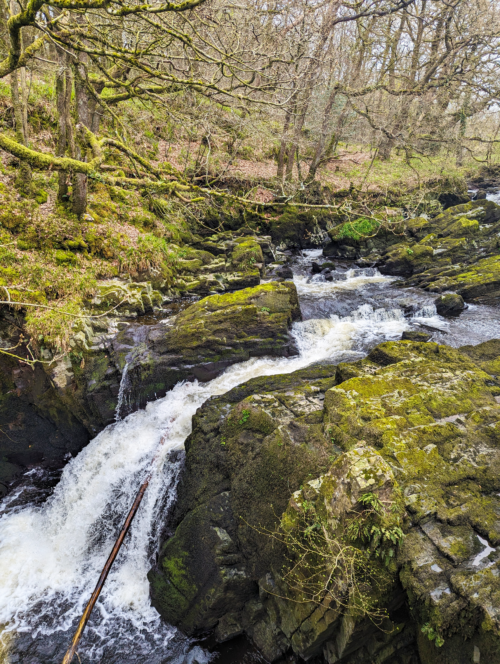
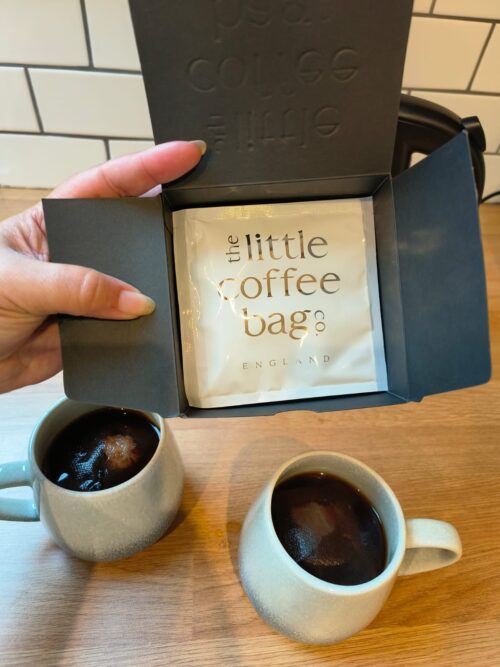



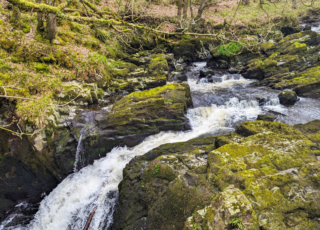

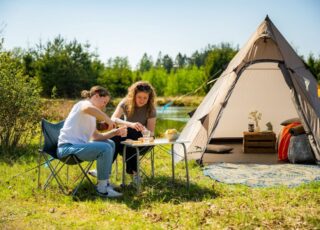

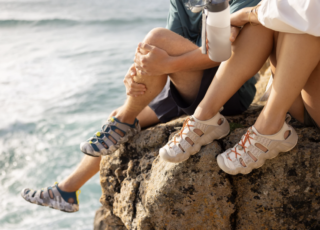
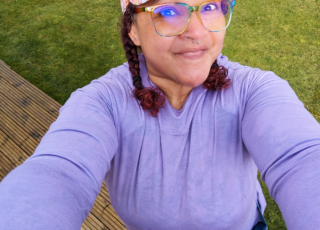

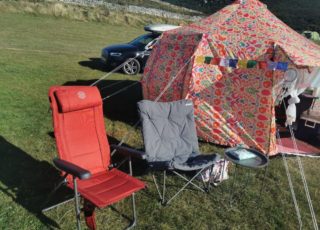
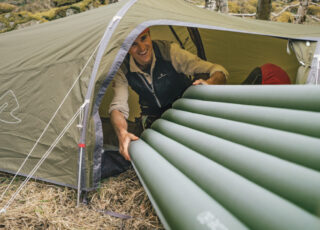
![CAMPING | Here’s How To Stay Warm In Your Tent – Warm Camping Tips [Updated 2024]](https://www.campingwithstyle.co.uk/wp-content/uploads/2024/02/shell0816_photorealistic_realistic_photo_of_the_inside_of_a_c_dd26c3c4-c779-4081-85b0-72e66a81b03b_1-320x230.png)

![GEAR | The Best Warm Sleeping Bags For Spring Camping Trips [Updated March 2024]](https://www.campingwithstyle.co.uk/wp-content/uploads/2024/02/10-best-warm-sleeping-bags-2024-320x230.png)



